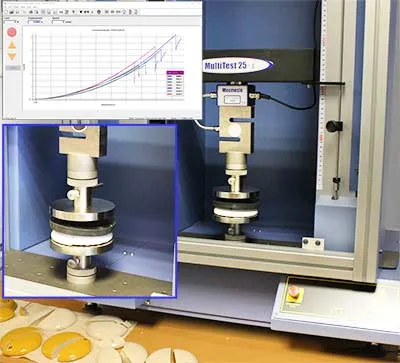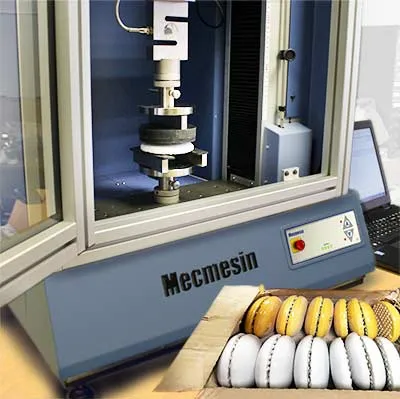
Ceramic road marker compression and flexural strength testing to ASTM 4280


Solution
- Software-controlled force test system and software
- Custom-made self-adjusting compression and flexure fixtures
Benefits
- Software control to apply the ASTM standard procedure and internal standards
- Multiple tests performed on one machine
- Ability to measure high loads from the twin-column tester and compensate for machine deformation
Requirement
Saudi Ceramics manufacture non-reflective road markers for indicating traffic lane delineation, shoulders and other direction markings. Their Ceramic Road Markers (CRM) are produced in white and yellow and an advantage of this production method is the longevity of the colour as opposed to painting techniques. ASTM D4280 provides a complete standard specification for this specific extended life type, nonplowable, raised reflective design. Two types of functional strength tests are included in the standard; compressive and flexural. Both tests specify high loading which the marker must withstand:
- the compressive strength test requires a deformation of less than 3.3 mm (0.13 in) when subjected to an equivalent representative load in service, and
- the longitudinal flexure strength test specifies withstanding of 8914 N (2000 lbf).
Solution
Mecmesin supplied a high-capacity MultiTest twin-column test stand to perform both tests. The ASTM standard indicates particular attributes for the fixture, notably elastomeric pads positioned above and below the marker specimen to prevent localised surface fracturing.
Custom fixtures were produced to appropriately apply the loading to the circular, domed markers. Three specimens of each type are tested, with EmperorTM software capturing the force and displacement data plus the point of fracture. If any of the test pieces prematurely fail, the whole batch must be rejected. The twin-column machine is able to exert forces up to the established safe maximum threshold to enable confidence in the structural integrity of the batch.
The software’s graphical output enables the flexure criteria to be checked at the recommended loading. This powerful compression testing system enables Saudi Ceramic to test their products to rigorous quality standards and maximise life expectancy.
Test equipment
- MultiTest twin column test stand
- Emperor Force software
- Compression and flexure fixtures designed to the ASTM-recommended specification













